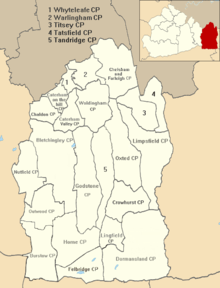Tandridge District
| Tandridge District | |
|---|---|
| Non-metropolitan district | |
 | |
 | |
| Sovereign state | United Kingdom |
| Constituent country | England |
| Region | South East England |
| Non-metropolitan county | Surrey |
| Status | Non-metropolitan district |
| Admin HQ | Oxted |
| Incorporated | 1 April 1974 |
| Government | |
| • Type | Non-metropolitan district council |
| • Body | Tandridge District Council |
| • Leadership | Alternative - Sec.31 (Conservative) |
| • MPs | Sam Gyimah |
| Area | |
| • Total | 95.8 sq mi (248.2 km2) |
| Area rank | 154th (of 326) |
| Population (2011 est.) | |
| • Total | 83,200 |
| • Rank | 282nd (of 326) |
| • Density | 870/sq mi (340/km2) |
| • Ethnicity[1] |
93.8% White 2.0% S.Asian 1.8% Black 1.4% Mixed Race |
| Time zone | GMT (UTC0) |
| • Summer (DST) | BST (UTC+1) |
| ONS code |
43UK (ONS) E07000215 (GSS) |
| OS grid reference | TQ3954252860 |
| Website | www.tandridge.gov.uk |
Tandridge is a local government district in Surrey, England containing part of the North Downs Area of Outstanding Natural Beauty, part of the Weald and the towns of Warlingham, Caterham, Oxted, Godstone and Lingfield. The area has several woodlands and some open heathland. Elevations range from 267m at Botley Hill, North Downs to 42m above sea level near Edenbridge.[2] The district council offices are in Oxted Town Centre, the second biggest settlement in the district.
History
It is named for a hillside village and slope on the south slope of the North Downs, Tandridge. The early local government Tandridge hundred of Surrey covered roughly the same area. Through the 19th century, hundreds lost relevance and urban and rural districts replaced any remaining functions in 1894.
The district was formed on 1 April 1974, under the Local Government Act 1972, by the merger of Caterham and Warlingham urban district along with Godstone Rural District. Since 2000, civil parish councils once again cover the district.
The district is not currently twinned however one of its towns, Lingfield is twinned with Plaisance du Touch, Toulouse, France.[3]
Governance
Elections to Tandridge District Council are held in three out of every four years, with one third of the 42 seats on the council being elected at each election. From the first election in 1973 to 1990 the Conservative party controlled the council, but for most of the 1990s no party had a majority. This changed at the 2000 election when the Conservatives reclaimed a majority, which they have held since. As of the 2012 election the council is composed of the following councillors:-[4]
| Party | Councillors | |
| Conservative Party | 34 | |
| Liberal Democrats | 6 | |
| Independent | 2 | |
District Council Committees
- Community Services - leisure, refuse collection, recycling, public toilets, litter and street cleaning.
- Planning - planning, applications, development.
- Housing - council housing.
- Licensing
- Overview & Scrutiny - corporate strategy, performance indicators, Best Value, audit reports.
- Planning Policy - Local Plan, Land charges, building control, environmental health.
- Resources - Finance, community safety, Council Tax, benefits, business rates, information technology.
- Standards - councillors' code of conduct.[5]
Towns, villages, neighbourhoods and Civil Parish(es)

| Town, village or neighbourhood | Parish 1 | Parish 2 |
|---|---|---|
| Bletchingley which includes South Park, Brewer Street and Warwick Wold | Bletchingley | |
| Burstow which includes Smallfield** and Weatherhill | Burstow | |
| Caterham | Caterham on the Hill | Caterham Valley |
| Chaldon | Chaldon | |
| Chelsham | Chelsham and Farleigh | |
| Crowhurst | Crowhurst | |
| Dormansland which includes Dormans Park and Haxted | Dormansland | |
| Farleigh which includes Fickleshole | Chelsham and Farleigh | |
| Felbridge which includes Domewood | Felbridge | |
| Godstone which includes South Godstone*, Tyler's Green, Church Town, Tilburstow and Blindley Heath* | Godstone | |
| Horne which includes Newchapel and Whitewood | Horne | |
| Limpsfield which includes Limpsfield Chart*, Paines Hill and Langhurst | Limpsfield | |
| Lingfield which includes Felcourt | Lingfield | |
| Outwood | Outwood | |
| Oxted which includes Hurst Green* and Holland | Oxted | |
| Nutfield which includes South Nutfield* and Ridge Green | Nutfield | |
| Tandridge which includes Crowhurst Lane End | Tandridge | |
| Tatsfield | Tatsfield | |
| Titsey | Titsey | |
| Warlingham which includes Hamsey Green* | Warlingham | |
| Whyteleafe | Whyteleafe | |
| Woldingham which includes Woldingham Garden Village | Woldingham | |
| [6] | ||
Each civil parish is named after one of its towns or villages which has been established around an Anglican church. All other settlements/neighbourhoods with their own Anglican church or chapel and therefore traditionally in England defined as "a village" are marked with an asterisk. A double asterisk indicates the locality has a church hall used as a Church of England church.[7] One chapel in Limpsfield ecclesiastical parish and civil parish has no adjoining settlement, in Staffhurst Wood.
See also
References
- ↑ Office for National Statistics: Neighbourhood Statistics: Tandridge
- ↑ Local Authority Map. Accessed 2012-04-23
- ↑ District Council link to external website. Accessed 2012-04-23
- ↑ "Tandridge councillors". BBC News Online. 10 May 2012. Retrieved 7 November 2012.
- ↑ District Council website. Accessed 2012-04-26
- ↑ Ordnance Survey map, courtesy of English Heritage
- ↑ Church of England website - ecclesiastical parish finder
External links
| |||||||||||||||||||||||||||||||
Coordinates: 51°15′26″N 0°00′00″E / 51.2573°N 0.0000°E
